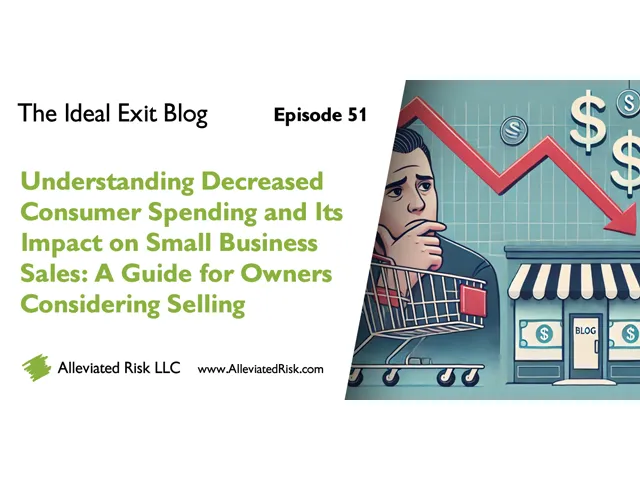
Understanding Decreased Consumer Spending and Its Impact on Small Business Sales: A Guide for Owners Considering Selling - The Ideal Exit Blog - Edition 51
In the dynamic world of small business, economic shifts often dictate the rhythm of our operations. One such shift that has recently gained attention is decreased consumer spending. For small business owners, this trend not only affects day-to-day revenue but also has significant implications if you're contemplating selling your business. In this blog post, we will explore how decreased consumer spending impacts sales and what you should consider if you're thinking about selling your business in these challenging times.
The Ripple Effect of Decreased Consumer Spending
Consumer spending is the lifeblood of most small businesses. When consumers tighten their belts, several immediate effects become apparent:
Reduced Revenue Streams: Fewer purchases mean a direct hit to your revenue. This decline can be more pronounced in discretionary sectors such as retail, dining, and entertainment.
Inventory Management Issues: Lower demand can lead to excess inventory, which ties up capital and space, further straining financial resources.
Price Wars and Discounting: To attract the limited consumer dollars, businesses may engage in aggressive discounting, which can erode profit margins.
Cash Flow Challenges: Consistent cash flow is crucial for operations, and decreased sales can lead to cash crunches, making it difficult to meet expenses and invest in growth.
Operational Adjustments: Businesses may need to cut costs, which could include reducing staff, scaling back on marketing, or postponing expansion plans.
Evaluating Your Business for Sale
If you’re in a position where selling your business seems like a viable option, it’s essential to understand how decreased consumer spending can affect the sale process. Here are some considerations:
Valuation Adjustments: The value of your business is often tied to its revenue and profitability. With decreased consumer spending, these metrics may be lower, potentially reducing your business’s valuation.
Buyer Confidence: Prospective buyers are likely to conduct thorough due diligence. They will scrutinize your financials, market position, and the broader economic context. Decreased consumer spending may make buyers more cautious, impacting their willingness to pay a premium.
Highlighting Resilience: Demonstrating how your business has managed through downturns can be a selling point. Showcasing adaptability, such as pivoting to online sales or diversifying product lines, can instill confidence in potential buyers.
Timing the Market: While it’s challenging to predict economic conditions, timing can be critical. If possible, consider waiting for signs of economic recovery, which can improve consumer confidence and spending.
Strategic Partnerships: Sometimes, merging with a complementary business can be more beneficial than a straight sale. This can provide synergies and a stronger market position, making the combined entity more attractive.
Preparing Your Business for Sale
If you’ve decided to move forward with selling your business despite the challenging environment, preparation is key:
Financial Health: Ensure your financial records are up-to-date and transparent. Clear financials help buyers understand the true picture and can expedite the sale process.
Operational Efficiency: Streamline operations to improve profitability. Cutting unnecessary costs and optimizing processes can make your business more appealing.
Customer Base: Maintain strong relationships with your customers. A loyal customer base can be a significant asset.
Growth Potential: Identify and clearly communicate growth opportunities. Whether it’s untapped markets, product expansion, or operational improvements, showing potential can attract buyers.
Professional Assistance: Engage with business brokers or advisors who have experience in your industry. They can provide valuable insights, assist with valuation, and help you navigate the complexities of selling a business.
Conclusion
Decreased consumer spending undeniably poses challenges for small business owners, both in operations and in potential sales. However, with strategic planning, careful evaluation, and thorough preparation, you can navigate these waters effectively. Whether you choose to weather the storm or move towards selling, understanding the implications of consumer spending trends will enable you to make informed decisions that best serve your business interests.
In these times of economic uncertainty, staying informed and agile is your best strategy. By adapting to the current environment and preparing meticulously, you can turn challenges into opportunities, ensuring the best possible outcome for your business transition.
My Ideal Exit Newsletter
Looking to sell your small business and want to maximize its value?
Our 💥💥 exclusive newsletter 💥💥 offers actionable insights on business valuation, expert tips for creating a winning exit strategy, and the latest market trends in acquisitions. You’ll make your business more attractive before the sale. Sign up now to stay ahead in your journey toward a successful business exit!
👉👉👉 Signup Here Today 👉👉👉 https://www.alleviatedrisk.com/get-the-ideal-exit-newsletter
We cover elements to enhance your preparedness for selling a business, and ultimately achieve your 🎯 goal of achieving My Ideal Exit.
1. 📊 Valuation Expertise: Insights on how to maximize the value of your business.
2. ⛵ Exit Strategy Optimization: Tips on planning a smooth and profitable exit.
3. 📈 Market Trends: Stay updated on current mergers, acquisitions, and industry shifts.
4. 🤝 Buyer Connections: Discover potential buyers and strategic partnerships.
5. 💰 Business Growth Hacks: Strategies to boost business attractiveness before a sale.

